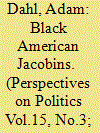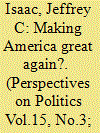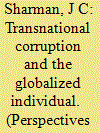|
|
|
Sort Order |
|
|
|
Items / Page
|
|
|
|
|
|
|
| Srl | Item |
| 1 |
ID:
154909


|
|
|
|
|
| Summary/Abstract |
While scholars of African American political thought have done a remarkable job centering focus on black thinkers, they still largely frame their endeavor in reference to the geo-political boundaries of the U.S. nation-state, thereby ignoring the transnational and diasporic dynamics of black politics. The consequence is that alternative traditions of thought in the Americas—e.g., Caribbean traditions—are cast as irrelevant to questions of racial exclusion in U.S. political thinking. I seek to correct nation-centric perspectives on U.S. political thought and development by demonstrating the utility of the “transnational turn.” Drawing on the framework developed in C.L.R. James’s The Black Jacobins, I trace how an influential cohort of abolitionists in the antebellum United States looked to the Haitian Revolution as a model for the overthrow of slavery. Engaging the writings and speeches of David Walker, James Theodore Holly, and Frederick Douglass, I then argue that radical abolitionists operated in the same ideological problem-space as Haitian revolutionaries and adopted a specific model of revolution as much indebted to Haitian political thought as Anglo-American models of anti-colonial revolt. By implication, racially egalitarian movements and moments in U.S. political development cannot be adequately understood with exclusive reference to national traditions of thought.
|
|
|
|
|
|
|
|
|
|
|
|
|
|
|
|
| 2 |
ID:
154913


|
|
|
|
|
| Summary/Abstract |
When work on the democratic peace first emerged it contributed to the revitalization of liberal thought and represented an important contribution to International Relations (IR). Yet innovation has been replaced by stagnation. Coding and correlation are debated ad infinitum, while little attention is given to growing economic inequality, voter alienation, a decline in traditional parties, rising populism and a wide array of related trends that raise serious doubts about the health of democracies at the center of the zone of peace. Yet if democratic institutions are not functioning as they are meant to, and norms of compromise are disappearing domestically, what hope can there be that these will facilitate cooperative behavior between democracies? Rather than promoting peace, could it be that capitalism in its contemporary neoliberal form is undermining or hollowing out democracy? The static understanding of democracy adopted by this research means that such questions have been largely overlooked. In response, I focus on two major changes impacting established democracies and consider their significance for democratic peace arguments: the decline of democratic institutions and culture, as well as how neoliberalism is reshaping the relationship between democracy and capitalism. In developing this argument, I propose that the template that the democratic peace research program offers for studying the world is emblematic of—and contributing to—a troubling contracting of our political vision. An excessive concern with methodological rigor, combined with a narrow understanding of what qualifies as valid research, has resulted in a body of scholarship that is remarkably sophisticated but has surprisingly little to say about democracy and its place in the world.
|
|
|
|
|
|
|
|
|
|
|
|
|
|
|
|
| 3 |
ID:
154916


|
|
|
|
|
| Summary/Abstract |
In the study of political knowledge, the emphasis on facts is misplaced. Evidence has grown that predispositions and social contexts shape how individuals are exposed to and interpret facts about politics, and the ready availability of information in the contemporary media environment may exacerbate these biases. We reexamine political knowledge from the bottom up. We look at what citizens themselves treat as relevant to the task of understanding public affairs and how they use this information. We draw upon our research in three different projects involving observation of political talk and elite interviews to do so. We observe that people across a range of levels of political engagement process political information through the lens of their personal experience. Failing to acknowledge this aspect of the act of using political information presents an incomplete empirical understanding of political knowledge. We propose an Expanded Model of Civic Competence that presents an alternative interpretation for what it means to be an informed citizen in a democracy. In this model, the competence of listening to and understanding the different lived experiences of others cannot be considered separately from levels of factual knowledge.
|
|
|
|
|
|
|
|
|
|
|
|
|
|
|
|
| 4 |
ID:
154910


|
|
|
|
|
| Summary/Abstract |
M.K. Gandhi was the undisputed leader of India's struggle for independence. Yet his vision for postcolonial India was completely marginalized at the moment of decolonization. The article takes this seemingly paradoxical juncture as the vantage point from which to offer a critique of Gandhi's political thought and more broadly an analysis of the shift from anticolonial movements to postcolonial rule. Through the voices of Gandhi's two most significant contemporary critics—B.R. Ambedkar and Jawaharlal Nehru—the article shows how his ideas failed to either inspire the struggle of the ruled (Ambedkar), or address the anxieties of the would-be rulers (Nehru). Gandhi's vision for a postcolonial India persisted within the conceptual constellation of negating colonial modernity, rather than the historical possibilities of postcolonial futures. These predicaments provide an opportunity to analyze the persistence of modern western political imaginaries in the decolonized world. Not through mere assertions of continuity or mimicry, but rather through the concrete struggles, aspirations, and anxieties that constituted the strands of those transitional moments.
|
|
|
|
|
|
|
|
|
|
|
|
|
|
|
|
| 5 |
ID:
154908


|
|
|
| 6 |
ID:
154914


|
|
|
|
|
| Summary/Abstract |
The Freedom in the World (FITW) ratings of countries’ freedom, created by Freedom House in 1972, are widely used by many U.S. audiences, including journalists, policymakers, and scholars. Why and how did these ratings acquire private authority in the United States? Furthermore, why and to what extent have they retained private authority over time and across different audiences? Contrary to previous research on private authority, which emphasizes the role of raters’ expertise and independence, I advance an argument that emphasizes the role of ideological affinity between raters and users. Specifically, I argue that ratings are more likely to have authority among actors that share raters’ ideas about concept definition and coding. I also argue that ratings are more likely to have authority among weak actors that depend on powerful other users of the ratings. Diverse evidence and methods—including data on the ratings’ usage, an internal archive of Freedom House records, interviews with key informants, and a statistical analysis of bias—support the argument.
|
|
|
|
|
|
|
|
|
|
|
|
|
|
|
|
| 7 |
ID:
154912


|
|
|
|
|
| Summary/Abstract |
In an extractive economy with territorially uneven costs and benefits, who should decide the fate of oil and mining projects: directly affected minorities or national citizenries? I reframe this question empirically: How are the collective identities and interests attached to various scales of democracy politically constructed in the increasingly frequent conflicts over resource extraction in Latin America, and what can we learn from these conflicts about broader dynamics of democratic contestation? To answer this question, I propose the concept of scaling democracy: the agonistic processes by which the scales of democratic decision-making and the democratic people are contested, established, and transformed. The concept of scaling democracy draws our attention to the ways in which the collective identities and interests attached to the various scales of democracy are constructed. These interest-articulations and collective identities are shaped by available institutional norms, organizational infrastructures, and social meanings. I draw on data from participant observation of a community mining consultation in Ecuador, and show that participatory institutions in the arena of resource extraction have fueled a contentious process of scaling democracy, with broader implications for the study of participatory democracy and scholarship on the relationship between resource-dependency and democracy.
|
|
|
|
|
|
|
|
|
|
|
|
|
|
|
|
| 8 |
ID:
154911


|
|
|
|
|
| Summary/Abstract |
Tocqueville’s discussion of American Indians in Democracy in America is often read as the paradigmatic expression of a conventional story about American political expansion. This narrative holds that westward expansion was easy, in part because American Indians did not offer much resistance. Historians of political thought and scholars of American Political Development tend to affirm this narrative when they read Tocqueville’s text as suggesting merely that Indians are “doomed” to an inevitable extinction. Our interpretation here proceeds along different lines, with a greater focus on the ways in which contending Jacksonian-era discourses of Indian nomadism are represented in Tocqueville’s text. We argue that Democracy reflects complex and often competing descriptions of inherent Indian nomadism, retreat, and removal, with varying attributions of causal responsibility for disappearing Indian populations. This reading of Tocqueville highlights contentions about Indian removal that are often ignored or neglected in current scholarship, and can therefore help us to better appreciate both his text and his time.
|
|
|
|
|
|
|
|
|
|
|
|
|
|
|
|
| 9 |
ID:
154915


|
|
|
|
|
| Summary/Abstract |
We present a new, more transnational, networked perspective on corruption. It is premised on the importance of professional intermediaries who constitute networks facilitating cross-border illicit finance, the blurring of legal and illegal capital flows, and the globalization of the individual via multiple claims of residence and citizenship. This perspective contrasts with notions of corruption as epitomized by direct, unmediated transfers between bribe-givers and bribe-takers, disproportionately a problem of the developing world, and as bounded within national units. We argue that the professionals in major financial centers serve to lower the transaction costs of transnational corruption by senior foreign officials. Wealthy, politically powerful individuals on the margins of the law are increasingly globalized as they secure financial access, physical residence, and citizenship rights in major OECD countries. These trends are evidenced by an analysis of the main components of the relevant transnational networks: banks, shell companies, foreign real estate, and investor citizenship programs, based on extensive interviews with key informants across multiple sites.
|
|
|
|
|
|
|
|
|
|
|
|
|
|
|
|
|
|
|
|
|